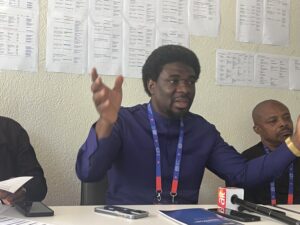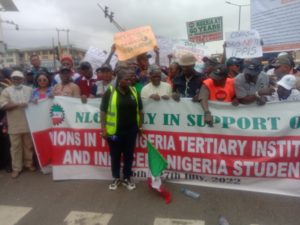Why COVID-19 strategies must invest in human-centred recovery – ILO

Economic and social recovery from the pandemic will require policies that promote decent work, address poverty and inequalities, and encourage a green recovery, the International Labour Organization (ILO)’s Director-General has said in statements to the World Bank and International Monetary Fund’s Spring Meetings.
Ryder emphasized that COVID-19 crisis recovery policies must be human-centred and address pre-existing world of work challenges as well as the impact of the pandemic.
Citing the sharp increase in poverty and inequalities seen since the pandemic began, he also warned delegates that without comprehensive and concerted policy efforts, “there is a very real risk that the COVID-19 crisis will leave a legacy of widening inequality and social injustice.”
“Coherent, multilateral action is essential to ensure that economic and social recovery is as human-centred as the impact of the pandemic itself,” he said. He pointed out that the ILO Centenary Declaration for the Future of Work , adopted unanimously by ILO Member States in 2019, offered an internationally-agreed roadmap to more inclusive and resilient societies.
“There is a very real risk that the COVID-19 crisis will leave a legacy of widening inequality and social injustice,” Guy Ryder, ILO Director-General
“[Accelerating] implementation of this roadmap should be made a top priority of public policy and international cooperation,” he said.
In his written statement to the Development Committee, Ryder said the response to COVID-19 should prioritize the creation of decent work.
He cited four components needed for a human-centred recovery that would also build resilience against future shocks. These include strengthening occupational safety and health systems, where the vast human impact of poor safety and health practices is estimated at an economic cost of four per cent of global GDP per year.
In addition, he said poor and vulnerable people should be supported, including with better social protection.
“We have an opportunity today to join forces around a common paradigm that recognizes both the value and urgency of investing in comprehensive and adequate social protection systems,” he said.
He added, “Support for business growth and job creation must be sustainable and focus on the quality of employment, with policies and measures that reach all workers and businesses, including the informal economy.
The institutions of work should be strengthened, including freedom of association and more effective collective bargaining and other social dialogue – including in relation to wages.”
In remarks to the IMFC, Ryder raised the issue of climate change. While this threatens macro-economic stability and millions of livelihoods, there is considerable potential to combine the transition to a low-carbon future with creating decent work.
“The trillions of dollars deployed in the economic recovery process can be a driver for sustainability and decent work creation,” he said, adding that ILO research indicated that a green recovery that focused on investment in renewable energy, building efficiency and green transport could add some 20.5 million jobs by 2030.
“Equal access to the right skills training and support for lifelong learning would be essential for this transition and a key element in inclusive and sustainable development, he added.
The WBG/IMF Spring Meetings were held virtually April 5 – 11, 2021. The Development Committee and the IMFC advise the WGB and IMF Boards of Governors on issues of global concern, including the world economic outlook, poverty eradication, economic development, and aid effectiveness.





